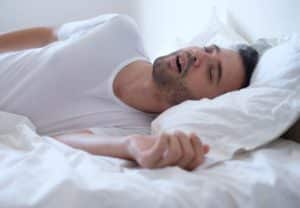
More serious snoring, coupled with gasping or choking, daytime drowsiness, morning headaches, and other symptoms isn’t just snoring it is most likely sleep apnea. This much more than snoring; this is the actual blockage of the airway, cutting off airflow. When the brain senses airflow is blocked it awakens the person, sometimes dozens of times per night.
It is estimated that one in 15 U.S. adults has obstructive sleep apnea. This equals about 18 million people. But about 80 percent of those people don’t have any idea they have sleep apnea, or they simply don’t take it seriously. That’s a bad idea. In this month’s eos Sleep blog, let’s get into how sleep apnea doesn’t simply make you snore or get a bad night’s sleep, but it can impact health across your body.
What Negative Effects Can Sleep Apnea Have on the Body?
Sleep apnea is discounted as a health condition by most people. That’s a risky line of thinking. Untreated sleep apnea can lead to a number of very serious health concerns:
- High blood pressure — Because you wake up over and over during the night, this process places stress on your body, activating your hormone systems. This raises your blood pressure.
- Heart disease — People with obstructive sleep apnea are more likely to have heart attacks, strokes, and atrial fibrillation.
- Type 2 diabetes — Sleep apnea is common in people with type 2 diabetes. This is because when your body is tired it has trouble effectively processing insulin.
- Weight gain — Sleep apnea can make your body release more of the hormone ghrelin, which makes you crave carbs and sweets.
- Adult asthma — Adult asthma and sleep apnea combined tend to cause the patient to suffer from more asthma attacks.
- Car accidents — People with sleep apnea are up to five times more likely than normal sleepers to have traffic accidents, and to even fall asleep at the wheel.
At eos Sleep, Dr. Volpi can diagnose your sleep apnea and then we can get you started down a path of treatment such as oral appliance therapy. If you have symptoms of sleep apnea, please give us a call at eos Sleep, (212) 873-6036, to set up a consultation with Dr. Volpi.
